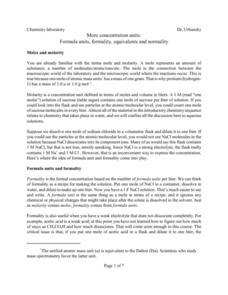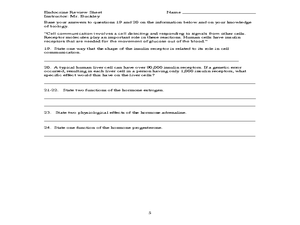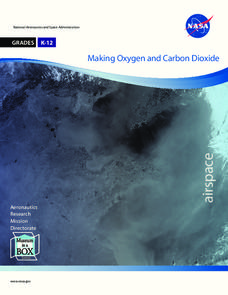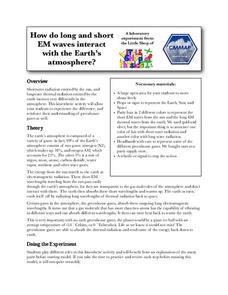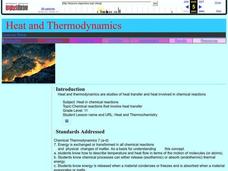Serendip
How Do Biological Organisms Use Energy?
When an organism eats, how does food become energy? Young biologists follow glucose through the process of cellular respiration to the creation of ADP using a discussion-based activity. The resource also highlights conservation of mass...
Curated OER
Types of Reactions
In this reactions worksheet, students complete the given reactions by writing the products. Students do examples of composition, decomposition, single replacement, double replacement, and combustion reactions. This worksheet has 54...
Curated OER
Atomic Theory
An extremely thorough presentation walks new chemists through the basics of matter. There really isn't a unifying theme, however So many topics are covered: forces, elements, atomic structure, chemical properties, compounds, quarks,...
American Chemical Society
Does Temperature Affect Dissolving?
When making sweet tea, why do people dissolve the sugar in hot tea instead of cold tea? The class discusses the previous lab and builds upon it. Working in groups, they design an experiment to determine how temperature affects the...
Curated OER
Cellular Respiration
Students are often confused by the huge amount of information and detail that can be learned about respiration. This is a great presentation summarizing the main 4 stages of cellular respiration. It is clear and uses diagrams and labels...
National Institute of Open Schooling
Electrochemistry
In an electrolytic cell, electrical energy is converted into chemical energy, the exact opposite of a battery! Lesson 15 in a series of 36 explores electrochemistry. Participants begin by reading and discussing oxidation/reduction...
Curated OER
Formula Units
In this chemistry worksheet, students examine the concepts of mole and molarity in order to apply in the laboratory setting. The sheet includes in depth background information.
Curated OER
Endocrine Review Sheet
Starting with a diagram of the kidneys and urinary tract of the human, this sheet has questions about excretion, blood concentrations of hormones, gland feedback mechanisms and the effects of some hormones.
Curated OER
Covalent Bonding
Using chlorine as the model to demonstrate the structures and representations, this PowerPoint clearly labels and details the main atomic structures and reasons for bonding. The electrons in the outer shell are diagramed and then the...
Virginia Department of Education
Soap, Slime, and Creative Chromatography
Do you think chromatography paper suffers from separation anxiety? Young chemists make soap, slime, silly putty, and experiment with chromatography in this instructional activity. The material includes clear instructions for each...
Texas State Energy Conservation Office
Global Climate Change
Here is an extensive reading resource that addresses our climate change crisis. It thoroughly explains the greenhouse effect, related Earth cycles, and the history of climate change. Use it as part of the intended unit, published by the...
Curated OER
Cell Respiration Worksheet
Beginning biologists demonstrate their grasp on cellular respiration, photosynthesis, and energy flow though ecosystems when completing this worksheet. Fifteen multiple choice and short answer questions test their knowledge. Because of...
Science Geek
Ionic Bonding
Here's a presentation that answers the age-old question of the covalent bond to the ionic bond, "Why won't you share?" Included is information about covalent and ionic bonds, the octet rule, ionic compounds, cations versus anions, and...
NASA
Making Oxygen and Carbon Dioxide
Some like it hot! Scholars observe both exothermic and endothermic reactions as part of the carbon dioxide oxygen cycle. First, scientists demonstrate (or watch) a chemical reaction to create pure oxygen using fire for confirmation....
Teach Engineering
What is a Nanometer?
Teams learn about the size of a nanometer by measuring objects and converting those measurements. A worksheet then tests the groups' abilities to use nanometers by having them determine the size of objects that are too small to measure.
Colorado State University
How Do Long and Short EM Waves Interact with the Earth's Atmosphere?
Things are about to heat up in your classroom! A kinesthetic lesson asks learners to play the part of the gases in the earth's atmosphere and interact with the sun's radiation. The focus is to learn the impact of the increasing...
NASA
Christa's Lost Lesson: Effervescence
How are chemical reactions affected by gravity? Learners explore the phenomenon of effervescence as part of the Christa's Lost Lessons series. They compare findings in an experiment on effervescence to a video of a similar experiment in...
Curated OER
What is Water?
Students examine water's properties. They participate in hands-on activities to show the properties of water.
Curated OER
Classroom Aquaponics: Exploring Nitrogen Cycling in a Closed System
Students investigate nutrient cycling in a simplified desktop ecosystem involving aquarium and hydro-ponically grown plants. They set up an aquarium with 10 gallons of water at least a week before the lab is planned and place...
Curated OER
Heat and Thermodynamics
This is actually a 10-day mini unit on thermal energy for your high school chemists. Every avenue is taken to get learners absorbed in heat: a pretest, a PowerPoint presentation, Internet exploration, demonstrations, lab activities, and...
Curated OER
Oxidation Reduction
In this chemistry worksheet, young scholars examine oxidation reduction in order to apply it in the laboratory setting. The sheet includes in depth background information.
Curated OER
Oxidation Reduction Reactions
In this chemistry worksheet, students find the outcomes necessary for the oxidation reduction reactions. The sheet includes background information.
Curated OER
Survival Still
Lead your class to construct a solar still on campus to demonstrate how water can be extracted from the soil. The power of solar energy is emphasized, as is the concept of how capillary water can be recovered and purified by using a...
Curated OER
Color
An interesting set of details about the light spectrum, these slides explain how objects reflect and absorb light to affect how they appear to the human eye. The differences in mixing lights or pigments is explained and some everyday...
Other popular searches
- Gumdrop Atoms and Molecules
- Counting Atoms Molecules
- Making Atoms and Molecules
- Atoms & Molecules Ppt
- Matter Atoms Molecules
- Science, Atoms and Molecules
- Science Atoms and Molecules
- Atoms Molecules Elements
- Atoms & Molecules Pot
- Atoms and Molecules Lesson
- Atoms Molecules Units
- Atoms and Molecules Musical








